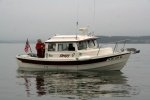ghone":1gwsubsk said:
Alaska is big be self sufficient and prepped. Local boaters can help but Boat US may be sparse. Not sure check with them.
This.
My advice would be to have an EPIRB for the boat, and a PLB (or better, I think the best product for this purpose is currently the Delorme InReach) for each person, a sharp knife, a storm whistle and emergency laser signal (the easiest way to see you from the air) as well as a small waterproof pouch that contains:
1. firestarter (bring extra, the place you are going is very rainy)
2. mylar blanket
3. Signal mirror
The above all
stays on your person at all times (okay okay, anytime you leave the cabin).
You can buy kits with this stuff in a little zip lock, but I put my own together (less $$$) and double vac-pack them to keep them compact and dry. You should never need to get in and out of it until you need it, so the zip lock is not necessary. Leave a little extra room and put a rubber band or two in there so you can roll the open end down and bind it to keep out water, and put a little dessicant pack in there, like the kind in beef jerky (I seriously take the desicant out of beef jerky and use it). Don't add non-essentials to this kit, or you will be less likely to keep it on you at all times.
There is basically the USCG and the state troopers in Alaska (not sure about BC) for rescues, although the Troopers will be found near towns. Your beacons/EPIRB and VHF are the best means for signaling. Fishermen will likely hear distress calls on VHF and be the first on site, so if you have to ditch, EPIRBS and Beacons should be your first priority, but get that VHF call out if there is any way to do so, and your ability to speak in a calm, clear, and non-panicked voice may be the difference between life and death. If things are getting hairy, take note of a precise GPS coordinate BEFORE TSHTF so you can read it.
If you make it to shore, you then need to consider that you are likely in a very remote spot, and may have bear problems. That is a whole other subject that has numerous means of preparation, depending on your skill with a firearm, among other factors. A can of bear spray is a good idea for a ditch bag, but not practical (or a good idea) to carry at all times on a small boat). The bigger issue here is general survival. At this point, if you can memorize the 7 steps to survival you can fall back on that with some confidence, and prioritize your actions once you are on land. These are:
1. RECOGNIZE: That you are in a life threatening, survival situation
2. INVENTORY: everything you have on you, or that you have found (odds are some of your stuff will be around, maybe)
3. SIGNALS: There will be a huge search effort, and your best chance of being found is right after you signal the need for help. Signals need to be among the first things you do. The universal signal for HELP is three identical signals. This is usually three LARGE fires. The fires should be far enough apart on the shore so that a ship in the distance sees three distinct spots. If they are close, they will only see one spot. Hundreds of feet. The more distance the better, but you ned to maintain all 3 fires, so not too far. If you have your fire starter, you will be in a much better spot.
4. SHELTER: Exposure will get you quickly. Even if the weather happens to be wonderful, it can go to heck quickly. Get your refuge going as soon as signals are set. Don't forget about your signals though! Keep maintaining them.
5. WATER: This step being so low a priority is counter-intuitive to most, but truly, unless you are having health problems from severe dehydration, forego pursuing a water supply until steps 1-4 are taken care of.
6. FOOD: Not surprisingly comes right after water.
7. PLAY: If you get through steps 1-6, you may be in a position where you are going to be doing some Gilligan Time. At this point, so long as steps 1-6 are set, your priority should be making the best of a bad situation, finding something to stimulate your mind. If you are with others, play games. If you are alone, you need to occupy yourself, and maybe you should put a little thought into how you might do that before you are in that situation. I, for example, would probably try to make musical instruments out of whatever I could find. The important thing is that you understand the importance of this, and keep that importance in your mind if you become Gilligan.
I hope this helps. I make my career working in the deep Alaskan backcountry, and teach survival, boating, bear/firearm safety, etc. What I've posted above comes from hard earned experience, as well as very thorough research (by others) into the factors that have contributed to Gilligan's survival or demise after a stranding on a remote shore. [/u]

